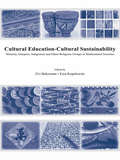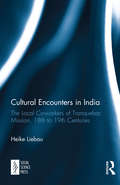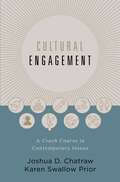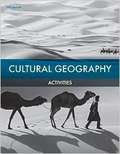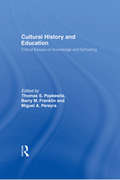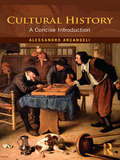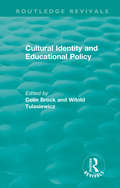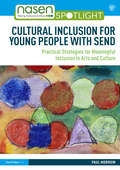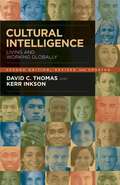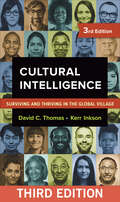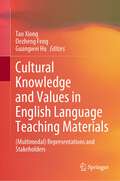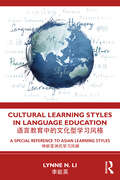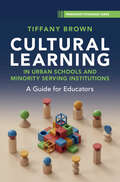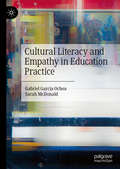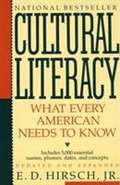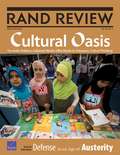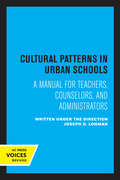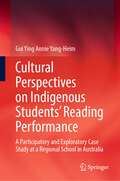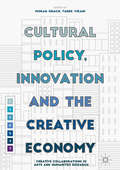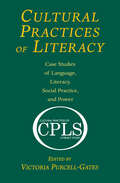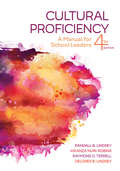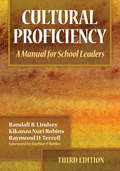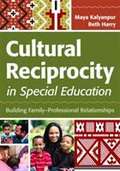- Table View
- List View
Cultural Education - Cultural Sustainability: Minority, Diaspora, Indigenous and Ethno-Religious Groups in Multicultural Societies
by Zvi Bekerman Ezra KopelowitzThis volume is a path-breaking contribution to the study of efforts of diaspora, indigenous, and minority groups, broadly defined, to use education (formal and informal) to sustain cultural continuity while grappling with the influences and demands of wider globalizing, nationalizing, or other homogenizing and assimilatory forces. Particular attention is given to groups that use educational elements other than second-language teaching alone in programs to sustain their particular cultural traditions. The focus of the book on cultural sustainability changes the nature of questions posed in multicultural education from those that address the opening of boundaries to issues of preserving boundaries in an open yet sustainable way. As forced and elective immigration trends are changing the composition of societies and the educational systems within them -- bringing a rich diversity of cultural experience to the teaching/learning process -- diaspora, indigenous, and minority groups are looking more and more for ways to sustain their cultures in the context of wider socio-political influences. This volume is a first opportunity to consider critically multicultural efforts in dialogue with educational options that are culturally particularistic but at the same time tolerant. Academics will find this an excellent reference book. Practitioners will draw inspiration in learning of others’ efforts to sustain cultures, and will engage in critical reflection on their own work vis-à-vis that of others. Teachers will realize they do not stand alone in their educational efforts and will uncover new strategies and methodologies through which to approach their work.
Cultural Encounters in India: The Local Co-workers of Tranquebar Mission, 18th to 19th Centuries
by Heike LiebauThe book is an English translation of an award winning German book. The history of social and religious encounter in 18th century South India is narrated through fascinating biographies and day to day lives of Indian workers in the Tranquebar Mission (1706-1845). The book challenges the notion that Christianity in colonial India was basically imposed from the outside. Liebau maintains that significant contributions were made by the local converts and mission co-workers who played an important role in the Tranquebar Mission.
Cultural Engagement: A Crash Course in Contemporary Issues
by Joshua Chatraw Karen PriorHow should Christians approach important contemporary issues like war, race, creation care, gender, and politics?Christians in every culture are confronted with social trends and moral questions that can be difficult to navigate. But, the Bible often doesn't speak directly to such issues. Even when it does, it can be confusing to know how best to apply the biblical teaching. <p><p> In Cultural Engagement: A Crash Course in Contemporary Issues authors Joshua D. Chatraw and Karen Swallow Prior first offer a broadly accessible framework for cultural engagement and then explore specific hot topics in current Western culture. <p> Featuring contributions from over forty top thinkers, proponents of various views on the specific topics present their approaches in their own words, providing readers an opportunity to fairly consider options. <p> Unique in how it addresses both big-picture questions about cultural engagement and pressing current issues, Cultural Engagement provides a thorough and broad introduction useful for students, professors, pastors, college ministers, and any believer wanting to more effectively exercise their faith in the public square.
Cultural Foundations of Learning
by Jin LiWestern and East Asian people hold fundamentally different beliefs about learning that influence how they approach child rearing and education. Reviewing decades of research, Dr Jin Li presents an important conceptual distinction between the Western mind model and the East Asian virtue model of learning. The former aims to cultivate the mind to understand the world, whereas the latter prioritizes the self to be perfected morally and socially. Tracing the cultural origins of the two large intellectual traditions, Li details how each model manifests itself in the psychology of the learning process, learning affect, regard of one's learning peers, expression of what one knows and parents' guiding efforts. Despite today's accelerated cultural exchange, these learning models do not diminish but endure.
Cultural Geography Activities
by Bju Press John SeneyCultural Geography Activities, 5th edition provides students with helpful projects, primary source readings, and chapter reviews for additional assessment opportunities.
Cultural History and Education: Critical Essays on Knowledge and Schooling
by Thomas PopkewitzCultural History and Education brings together an outstanding group of the leading scholars in the study of the cultural history of education. These scholars, whose work represents a variety of national contexts from throughout Europe, Latin America, and North America, contribute to a growing body of work that seeks to re-think historical studies i
Cultural History: A Concise Introduction
by Alessandro ArcangeliThe expression ‘cultural history’ is generally used today to signal a particular approach to history, one which could be applied to any object, and is mainly concerned with the sense men and women from the past gave to the world they lived in. In this introduction to cultural history as a subdiscipline, the reader will find the key steps in the historical development of the field from 1850 to the present. It surveys different ways in which cultural history has been practised, exploring intellectual history, the history of ideas and concepts, of mentalities, of symbols and representations, and of languages and discourses. Cultural History also maps the territory cultural history most effectively enlightens: gender; the family and sexuality; the body; senses and emotions and images; material culture and consumption; the media and communication. Lastly, it includes an appendix of biographies of a number of influential cultural historians. This concise and accessible introduction will be an essential volume for any university student studying cultural history.
Cultural Identity and Educational Policy (Routledge Revivals)
by Colin Brock and Witold TulasiewiczPublished in 1985. Cultural identity is a key factor in shaping educational policy. In many countries there are significant minority groups who require educating in a certain way in order to meet their specific cultural needs. Also, in countries which are trying to change direction politically, reshaping education is an important factor in bringing about this change. In many countries tension arises and reforms are required because educational policy fails to cater correctly for cultural needs. This book examines many facets of the problem in many important countries of the world. It looks at policies designed for ethnic minorities and at policies aimed at bringing about far-reaching societal and cultural change. It discusses the tensions caused by policies and the pressures for reform.
Cultural Inclusion for Young People with SEND: Practical Strategies for Meaningful Inclusion in Arts and Culture (nasen spotlight)
by Paul MorrowThis practical book offers a multifaceted view of cultural inclusion from the perspective of special educational needs and disabilities (SEND). It provides a road map for teachers to ensure increased participation in arts and culture for children and young people with SEND, defining a series of characteristics for good practice. Chapters explore spaces as diverse as galleries, museums, theatres and performance venues and include a variety of case studies, highlighting the experiences of young people and the organisations who partner with schools. Cultural Inclusion for Young People with SEND offers a compelling call to action and is an essential resource for those who have the power to improve and support the development of future provision for children with SEND.
Cultural Intelligence: Living and Working Globally
by David C. Thomas Kerr InksonGlobalization means that managers need to be prepared to do business with people from a wide range of cultures. But it's just not possible to learn the particular customs and traits of every culture you might regularly come into contact with.
Cultural Intelligence: Surviving and Thriving in the Global Village
by David C. Thomas Kerr C. InksonSucceed in Any Culture, in Every Situation In today's global economy, the ability to interact effectively across cultures is a fundamental job requirement for just about everyone. But it's impossible to learn the customs and traits of every single culture. David Thomas and Kerr Inkson present a universal set of techniques and people skills that will allow you to adapt quickly to, and thrive in, any cultural environment. You'll learn to discard your own culturally based assumptions and pay careful attention, in a mindful and creative way, to cues in cross-cultural situations. The authors show how to apply cultural intelligence in a series of specific situations: making decisions; communicating, negotiating, and resolving conflicts; leading and motivating others; and designing, managing, and contributing to multicultural groups and teams. This extensively revised third edition has been updated with new stories showing cultural intelligence in action. Thomas and Inkson have broadened the focus beyond business to include organizations of all kinds—nonprofits, governments, educational institutions, and more. And they include a reliable and valid measure of cultural intelligence based on a decade of research by an international team of scholars.
Cultural Knowledge and Values in English Language Teaching Materials: (Multimodal) Representations and Stakeholders
by Guangwei Hu Tao Xiong Dezheng FengThis book provides a contextualized and balanced look into the timely topic of values in English Language Teaching (ELT) materials with a primary focus on the Chinese context. It features three distinct conceptual and methodological perspectives, namely, perceptions of stakeholders such as material writers, teachers and students, multimodal construction of values, and textual representation of values. It is a valuable resource for those interested in the social, cultural, moral, and ideological dimensions of English education in general, and in the textual and multimodal construction of values in language teaching materials in particular.
Cultural Learning Styles in Language Education: A Special Reference to Asian Learning Styles
by Lynne N. LiThis book presents a nuanced look at the relationship between language learning styles and culture to illuminate how these important constructs are understood, employed and play out in the real world. Through the lens of different learning style dimensions—cognitive, affective, process-centred, environment-centred and cultural—Li unpacks and examines the commonly accepted tensions between learning styles, culture, teacher assumptions and teaching approaches. With a focus on Asian learning styles and Chinese learners, Li addresses the past and current debates and reconceptualises the roles and tensions between students’ learning, students’ cultural backgrounds and teaching styles. Li adeptly navigates this controversial arena to demystify preconceptions and provide avenues for innovative and effective classroom practices in language teaching. Ideal for pre-service ESL/EFL teachers, researchers and scholars, this book bridges the gap between research and practice on culture and language learning in the classroom.
Cultural Learning in Urban Schools and Minority Serving Institutions: A Guide for Educators (Progressive Psychology)
by Tiffany BrownThis book provides a comprehensive analysis of the social and organizational factors shaping K-16 teachers' cultural learning processes, through both a systematic review of the extant literature on K-12 urban teacher thinking and interviews with instructional staff at a high-performing minority serving institution (MSI). It highlights common challenges K-16 educators face in navigating cultural differences between themselves and their students. Drawing from cultural psychology, organizational behavior, and organizational psychology, the book offers evidence-based insights for creating school systems in which educators working with students from low-income and other minoritized cultural communities can critically examine and challenge their cultural assumptions to create more inclusive and supportive learning environments for all students, as well as develop and implement more culturally responsive classroom management practices.
Cultural Literacy and Empathy in Education Practice
by Gabriel García Ochoa Sarah McDonaldThis book explores a new approach to cultural literacy. Taking a pedagogical perspective, it looks at the skills, knowledge, and abilities involved in understanding and interpreting cultural differences, and proposes new ways of approaching such differences as sources of richness in intercultural and interdisciplinary collaborations. Cultural Literacy and Empathy in Education Practice balances theory with practice, providing practical examples for educators who wish to incorporate cultural literacy into their teaching. The book includes case studies, interviews with teachers and students, and examples of exercises and assessments, all backed by years of robust scholarly research.
Cultural Literacy: What Every American Needs to Know
by E. D. Hirsch Jr.Hirsch argues that children in the U.S. are being deprived of the basic knowledge that would enable them to function in contemporary society.
Cultural Oasis: For Arab Children, Collected Works Offer Roads to Tolerance, Critical Thinking
by Jeffrey Martini Gail L. Zellman Laura S. Hamilton Michal Perlman Jennifer L. SteeleFeature stories discuss the promotion of tolerance and critical thinking in the Arab world through children's media, the challenges faced by the United States in an era of fiscal austerity, and promising models for measuring teacher performance. Two other stories highlight the National Science Foundation's role in promoting research in the United States and how RAND is helping several countries to foster technological innovation.
Cultural Patterns in Urban Schools: A Manual for Teachers, Counselors, and Administrators
by Joseph D. LohmanThis title is part of UC Press's Voices Revived program, which commemorates University of California Press’s mission to seek out and cultivate the brightest minds and give them voice, reach, and impact. Drawing on a backlist dating to 1893, Voices Revived makes high-quality, peer-reviewed scholarship accessible once again using print-on-demand technology. This title was originally published in 1967.
Cultural Perspectives on Indigenous Students’ Reading Performance: A Participatory and Exploratory Case Study at a Regional School in Australia
by Gui Ying Yang-HeimThis book explores the contextual, particularly cultural-related, factors that may impact reading outcomes of young Indigenous learners in their early years, underpinned by the conceptual framework of cultural capital originated by Bourdieu. By drawing upon a participatory and exploratory case study, conducted at a regional school in Australia over a period of six months, it highlights the challenges that Indigenous students face in reading, and how the contextual factors contribute to Indigenous students’ development in reading skills and their reading performance. This book helps readers to gain a better and deeper understanding of Indigenous culture, the importance of the role that culture plays in Indigenous children’s literacy education, and how it shapes the way they learn and think.
Cultural Policy, Innovation and the Creative Economy: Creative Collaborations in Arts and Humanities Research
by Morag Shiach Tarek ViraniThis book develops important new insights into the conditions that enable effective collaborations between arts and humanities researchers and SMEs in the creative economy. Drawing on the work of Creativeworks London, an AHRC-funded Knowledge Exchange Hub for the Creative Economy, this is an in-depth study of how co-created and collaborative research projects work on the ground and will be of immense value to all these audiences. Chapters by researchers and practitioners examine a range of collaborative research projects supported by Creativeworks London's vouchers, which cover a large number of creative industry sectors and academic disciplines. The book identifies key learning from these projects that has wider relevance for academics, funders, policy makers, and SMEs in the creative economy. Morag Shiach is Professor of Cultural history at Queen Mary University of London, UK, where she is also Director of Creativeworks London and Vice-Principal for Humanities and Social Sciences. Her publications include Modernism, Labour and Selfhood in British Literature and Culture; Feminism and Cultural Studies; Hélène Cixous: A Politics of Writing; and Discourse on Popular Culture. Dr. Virani obtained his PhD from King's College London, UK. He is a full time researcher for Creativeworks London research project at Queen Mary University of London, UK. His research interests include the role of knowledge in the cultural economy, artistic knowledge within locally bounded artistic communities, and new work spaces in the creative and cultural economy.
Cultural Practices of Literacy: Case Studies of Language, Literacy, Social Practice, and Power
by Victoria Purcell-GatesThis volume presents case studies of literacy practices as shaped by culture, language, community, and power. Covering a range of contexts and exploring a number of relevant dimensions in the evolving picture of literacy as situated, multiple, and social, the studies are grouped around four overarching themes:*Language, Literacy, and Hegemony;*The Immigrant Experience: Language, Literacies, and Identities;*Literacies In-/Out-of-School and On the Borders; and*New Pedagogies for New Literacies. It is now generally recognized that literacy is multiple and woven within the sociocultural lives of communities, but what is not yet fully understood is how it is multiple--how this multiplicity plays out across and within differing sociocultural contexts. Such understanding is critical for crafting school literacy practices in response to the different literacy sets brought to school by different learners. Toward this end it is necessary to know what those sets are composed of. Each of the case studies contributes to building this knowledge in new and interesting ways. As a whole the book provides a rich and complex portrait of literacy-in-use. Cultural Practices of Literacy: Case Studies of Language, Literacy, Social Practice, and Power advances sociocultural research and theory pertaining to literacy development as it occurs across school and community boundaries and cultural contexts and in and out of school. It is intended for researchers, students, professionals across the field of literacy studies and schooling, including specialists in family literacy, community literacy, adult literacy, critical language studies, multiliteracies, youth literacy, international education, English as a second language, language and social policy, and global literacy.
Cultural Proficiency: A Manual for School Leaders
by Delores B. Lindsey Randall B. Lindsey Dr. Kikanza Nuri-Robins Dr. Raymond D. TerrellOur students’ futures depend upon it: If we’re to guarantee equitable access and improved academic outcomes for our historically underserved students, then we must first confront the deeply rooted biases and practices that for far too long have limited them. That’s where Cultural Proficiency: A Manual for School Leaders has already benefited tens of thousands of schools leaders--and the students, teachers, and communities they serve. Cultural Proficiency helps us all establish a mindset and worldview for effectively describing and responding to inequities. Its inside-outside approach to leadership is grounded in the assumption that honest introspection is a requirement to leading equity-driven change. And now, with updated content, new case studies, expanded vignettes, new activities and study guides, and an updated matrix, this fourth edition is more urgently needed than ever. What leaders love most is the way Cultural Proficiency lays the groundwork for powerful organizational growth with resources to: Engage colleagues in collaborative dialogue about creating powerful teaching and learning environments Recognize and respond to both individual and group differences to break down barriers Use the Cultural Proficiency Continuum to assess the limitations of school practices and identify opportunities to shift the culture Take this first step on the Cultural Proficiency journey and soon enough you, too, can create equitable educational opportunities and more inclusive environments in which differences are embraced. “This book is a riveting and unparalleled resource for all educational merchants of hope. . . . The insights, learning strategies, and professional development structures in this edition illuminate a path for all leaders to successfully commit to the journey of being equity champions!” --Dr. Erick E. Witherspoon, National Director of Equity Professional Development Services Generation Ready “There is no greater honor than to have one’s professional work become the inspiration for a new way of thinking, and transformative literature and action that change the world for schools and the children and youth they serve. I am grateful that the ideas have been so skillfully brought to scale by these authors.” --Dr. Terry L. Cross, MSW, Founder and Senior Advisor National Indian Child Welfare Association
Cultural Proficiency: A Manual for School Leaders
by Delores B. Lindsey Randall B. Lindsey Dr. Kikanza Nuri-Robins Dr. Raymond D. TerrellOur students’ futures depend upon it: If we’re to guarantee equitable access and improved academic outcomes for our historically underserved students, then we must first confront the deeply rooted biases and practices that for far too long have limited them. That’s where Cultural Proficiency: A Manual for School Leaders has already benefited tens of thousands of schools leaders--and the students, teachers, and communities they serve. Cultural Proficiency helps us all establish a mindset and worldview for effectively describing and responding to inequities. Its inside-outside approach to leadership is grounded in the assumption that honest introspection is a requirement to leading equity-driven change. And now, with updated content, new case studies, expanded vignettes, new activities and study guides, and an updated matrix, this fourth edition is more urgently needed than ever. What leaders love most is the way Cultural Proficiency lays the groundwork for powerful organizational growth with resources to: Engage colleagues in collaborative dialogue about creating powerful teaching and learning environments Recognize and respond to both individual and group differences to break down barriers Use the Cultural Proficiency Continuum to assess the limitations of school practices and identify opportunities to shift the culture Take this first step on the Cultural Proficiency journey and soon enough you, too, can create equitable educational opportunities and more inclusive environments in which differences are embraced. “This book is a riveting and unparalleled resource for all educational merchants of hope. . . . The insights, learning strategies, and professional development structures in this edition illuminate a path for all leaders to successfully commit to the journey of being equity champions!” --Dr. Erick E. Witherspoon, National Director of Equity Professional Development Services Generation Ready “There is no greater honor than to have one’s professional work become the inspiration for a new way of thinking, and transformative literature and action that change the world for schools and the children and youth they serve. I am grateful that the ideas have been so skillfully brought to scale by these authors.” --Dr. Terry L. Cross, MSW, Founder and Senior Advisor National Indian Child Welfare Association
Cultural Proficiency: A Manual for School Leaders
by Dr Kikanza Nuri-Robins Randall B. Lindsey Dr Raymond D. TerrellEmbark on a journey toward cultural proficiency that results in professional growth and organizational change! This powerful third edition offers fresh approaches, a revised organization, and new activities that enable leaders to engage in effective interactions with students, educators, and the communities they serve. The authors meticulously provide information gathered from their experiences working with schools, educational agencies, and organizations across the United States and Canada and show how school leaders can: Gain a personal understanding of what cultural proficiency means in practice Use collaborative activities to effect change in a school Lead a learning community toward becoming a culturally proficient organization
Cultural Reciprocity in Special Education: Building Family-Professional Relationships
by Maya Kalyanpur Beth HarryTo succeed in increasingly diverse classrooms, tomorrow's special educators need explicit training on working effectively with all families. Prepare the next generation of teachers with this accessible text, developed by two highly respected experts on cultural and linguistic diversity and inclusive education. Ideal for use as a supplementary textbook in a wide range of courses related to special education, this book gives educators a practical framework for cultural reciprocity a process that helps professionals and families examine their own values, respect each other's differences, and collaborate skillfully to benefit children. <p><p> To give special educators a deeper, more nuanced understanding of cultural reciprocity, the text also includes three chapter-long case studies that further illustrate the process at work. Readers will learn from the challenges and successes of an African American researcher working with a group of teenage mothers; two teacher educators collaborating on the Special Educators Entering a Diverse Society (SEEDS) project; and an Asian Indian teacher educator leading a class of mostly Caucasian students. A key text for future special educators and a valuable resource for in service training this book will help teachers build strong collaborative relationships with diverse families and ensure that all children receive the best possible education.
